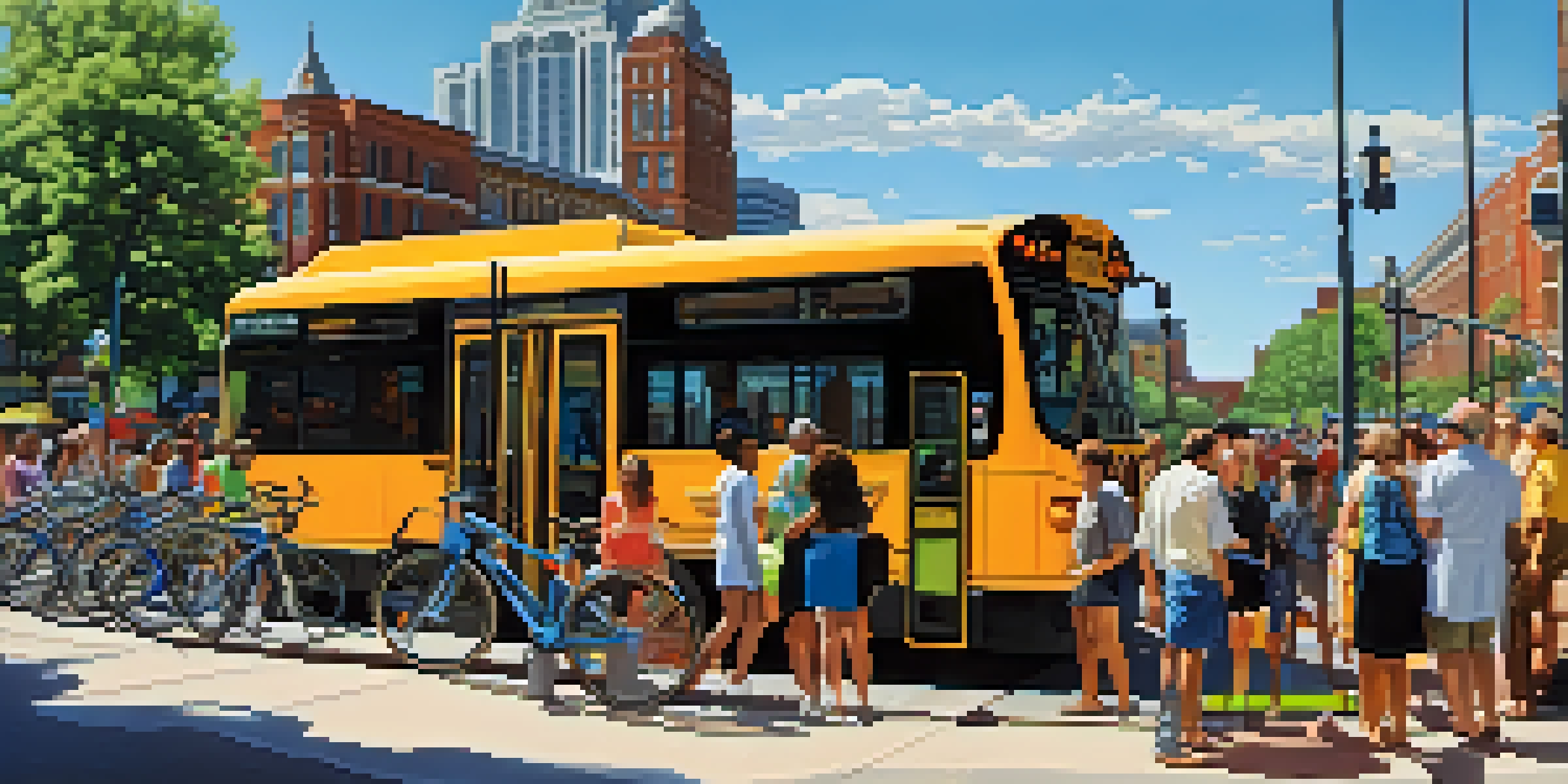Transportation Infrastructure: Boosting St. Louis's Economy

The Importance of Transportation Infrastructure for Cities
Transportation infrastructure is the backbone of any thriving city. It includes roads, bridges, railways, and public transit systems that facilitate the movement of goods and people. When these systems are well-maintained and efficiently designed, they contribute significantly to economic growth and development.
Transportation is the backbone of our economy, and investing in it is essential for our future growth.
In a bustling city like St. Louis, robust transportation options can attract businesses, create jobs, and enhance the quality of life for residents. For example, easy access to major highways and airports can encourage companies to set up shop, knowing their goods can be distributed quickly and efficiently.
Moreover, improved transportation infrastructure can reduce congestion and travel time, making the city more appealing to both businesses and individuals. A city that prioritizes transportation can foster a sense of community and encourage commerce, leading to a more vibrant local economy.
Current State of St. Louis's Transportation System
St. Louis has a mix of transportation options, but challenges remain. While the city boasts a network of highways and public transit systems, many roads and bridges are in need of repair. This aging infrastructure can lead to delays, increased transportation costs, and safety concerns.

Furthermore, public transit usage has not reached its full potential, which can limit access for those who rely on it for employment and daily activities. Addressing these issues is crucial for ensuring that St. Louis remains competitive in attracting businesses and talent.
Transportation Fuels Economic Growth
Well-maintained transportation infrastructure attracts businesses, creates jobs, and enhances residents' quality of life.
By investing in the modernization of its transportation systems, St. Louis can enhance connectivity and improve the overall efficiency of its economy. This will not only benefit businesses but also create a more inclusive environment for all residents.
Economic Benefits of Improved Transportation Infrastructure
Investing in transportation infrastructure yields significant economic returns. Studies show that for every dollar spent on infrastructure, there can be a return of up to four dollars in economic activity. This is because improved transportation reduces costs for businesses and enhances productivity.
Good infrastructure is the foundation of a competitive economy and a healthy community.
In St. Louis, upgrading roads and public transit can lead to increased accessibility for business locations and a more reliable commute for workers. This can attract new businesses and encourage existing ones to expand, ultimately leading to job creation.
Additionally, enhanced infrastructure can stimulate tourism by making the city more accessible to visitors. A well-connected city is likely to draw more tourists, boosting local businesses such as restaurants, hotels, and entertainment venues.
The Role of Public-Private Partnerships
Public-private partnerships (PPPs) are essential for funding transportation projects in St. Louis. These collaborations between government and private entities can help pool resources and expertise, making large-scale infrastructure projects more feasible. They can also lead to innovative solutions that address the city's unique transportation challenges.
For example, a PPP could facilitate the development of a modern transit system that integrates buses, light rail, and bike-sharing programs. Such initiatives can enhance mobility options for residents while also creating jobs in construction and operation.
Investment in Infrastructure is Crucial
Addressing St. Louis's aging transportation systems can improve connectivity, reduce congestion, and foster economic competitiveness.
Furthermore, successful partnerships can serve as a model for future projects, encouraging further investment in the city’s transportation network. By leveraging the strengths of both sectors, St. Louis can build a transportation system that meets the needs of its growing population.
Sustainability in Transportation Solutions
Sustainability is a key consideration in modern transportation infrastructure. As cities like St. Louis work to improve their transportation systems, integrating eco-friendly practices is more important than ever. This could include investing in electric buses, bike lanes, and pedestrian-friendly pathways that reduce reliance on automobiles.
By promoting alternative transportation options, St. Louis can help minimize traffic congestion and air pollution. This not only benefits the environment but also contributes to a healthier lifestyle for residents, making the city more attractive to potential newcomers.
Sustainable transportation solutions can also create new economic opportunities. For instance, the growth of green jobs in the transportation sector can help boost the local economy while addressing climate change challenges.
Community Engagement in Transportation Planning
Community engagement is vital when planning transportation infrastructure projects. Involving residents in the decision-making process ensures that their needs and preferences are considered, leading to more effective solutions. For example, public meetings can help gather feedback on proposed transit routes or infrastructure improvements.
When communities feel heard and involved, they are more likely to support projects that enhance their quality of life. This can lead to a stronger sense of ownership and pride in the city’s infrastructure, fostering a collaborative environment for future developments.
Sustainability Drives Future Solutions
Incorporating eco-friendly practices into transportation planning can minimize environmental impact while promoting economic opportunities.
Additionally, engaging with diverse community groups can highlight specific transportation needs, ensuring that improvements serve everyone, including those in underserved areas. A transportation system that works for all residents can significantly strengthen St. Louis's economy.
The Future of Transportation in St. Louis
Looking ahead, the future of St. Louis's transportation infrastructure holds promise. With continued investment and community involvement, the city can develop a system that meets the evolving needs of its residents and businesses. Innovative technologies, such as smart traffic signals and autonomous vehicles, may also play a role in shaping this future.
Moreover, as cities worldwide increasingly prioritize sustainable practices, St. Louis can position itself as a leader in eco-friendly transportation solutions. This not only benefits the environment but can also attract businesses focused on sustainability.

In conclusion, by investing in transportation infrastructure now, St. Louis can pave the way for a brighter economic future, improving the quality of life for its residents and creating a thriving environment for businesses.